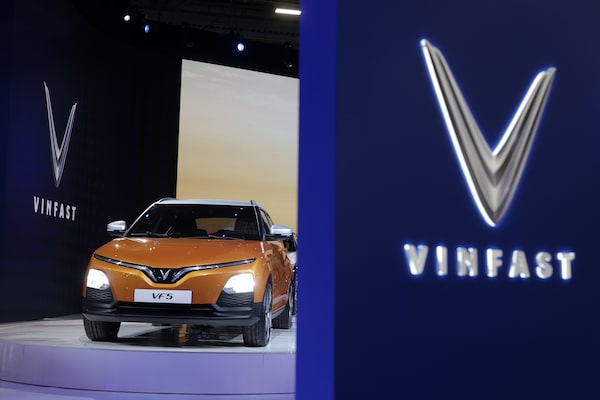
A VinFast VF 5 electric vehicle is displayed at CES 2022, at the Las Vegas Convention Center, on Jan. 5.Alex Wong/Getty Images
Vietnamese automaker VinFast will offer an innovative battery leasing program when it brings its all-electric vehicles to Canada later this year.
The details aren’t finalized, but the plan is for VinFast to sell the vehicle to a customer and lease the battery separately, probably for about the monthly cost of equivalent gasoline. The advantage would be that the vehicle itself could be 30-per-cent less expensive, and the battery would be automatically replaced under warranty when it degrades to 70-per-cent of its original strength.
“In our view, we think EVs with great technology should be within the reach of everyone,” says Hong Sang Bae, VinFast’s Chief Technology Officer. “So we focus on quality, technology and reasonable pricing, which we think makes us a little bit different from other competitors in the marketplace.”
VinFast showed three new vehicles – the VF 5, VF 6 and VF 7 – at the Consumer Electronics Show in Las Vegas on Wednesday, as well as the two vehicles it showed last November at the Los Angeles auto show. The two from Los Angeles are a mid-sized and full-sized SUV and have been renamed: formerly called the VF e35 and e36, they’re now called the VF 8 and VF 9. The three showed Wednesday are smaller SUVs that will be produced in 2023, and the smallest is not yet confirmed for Canada or the U.S.
No details were given about the specifications of the smaller vehicles, but VinFast announced last year that the VF8 and VF9 would be all-wheel drive, with ranges of at least 460 kilometres and power up to 402 horsepower.
Canadian pricing was not revealed at CES, but American pricing was announced as US$41,000 for the VF8 and US$56,000 for the VF9. Those prices do not include the lease of the battery, which could cost half as much again over the lifetime of the vehicle.
“We’d like to see the application of an EV incentive,” before determining Canadian pricing, says Hans Ulsrud, Chief Growth Officer for VinFast Canada. “We have a goal for an EV incentive. There are very aggressive targets for the Canadian government to hit by 2035, so if we want great adoption of EVs, what we’re expecting is maybe some of those limits will be adjusted.”
In other words, VinFast wants to convince the federal government to raise the maximum cost of an electric vehicle that qualifies for the $5,000 national rebate from its current $45,000 at a base trim level, or $55,000 at an enhanced trim level. It also wants to convince the government to consider the cost of the leased battery as separate from the cost of the rest of the vehicle.
Ulsrud said he hopes to release Canadian pricing by April. Customers who place a refundable deposit within the first three months of confirmed pricing will qualify as “pioneers” and receive rebates. In the U.S., a deposit of US$200 will earn a rebate of US$3,000 off the cost of the VF8, and US$5,000 off the cost of the VF9. The first VF8s will be delivered in Canada late this year, and the first VF9s will be delivered early next year.
The vehicles themselves sound exceptional on paper. They will have warranties of 10 years or 200,000 kilometres, and they will include Level 2 autonomous driving capabilities, similar to many current premium cars. Next year, they are expected to include more advanced Level 3 and even Level 4 abilities, which will allow them to park themselves remotely and drive themselves from a nearby parking space to where you are waiting.
“It is said that if you want to go fast, go alone. If you want to go far, go together,” said VinFast CEO Le Thi Thu Thuy, addressing the audience from onstage at CES. The company partners with international suppliers like ZF, Samsung and LG for much of its technology, as do most automakers.
Thuy, who is a vice-chairwoman at VinGroup, was announced as global CEO of VinFast on Dec. 27 after the abrupt resignation of CEO Michael Lohscheller, the former CEO of Opel Automobiles. The company said he left to “return to Europe due to personal reasons.”
VinFast is owned by VinGroup JSC, which is the largest private corporation in Vietnam and focuses on technology, industry and real estate. It’s new to automotive manufacturing and only began building cars in 2018, powered by gasoline and built on modified BMW platforms. They’re now the best-selling cars in their segments in Vietnam, though the company will stop making internal-combustion-engine vehicles by the end of this year.
Its 335-hectare manufacturing facility outside Hanoi has the capacity to produce 250,000 vehicles each year, and – if all goes well – there are plans to build a new manufacturing plant somewhere in the U.S. in 2024.
Lohscheller told The Globe and Mail in November that VinFast was considering a U.S. initial public offering to raise additional funds, after already investing more than US$5-billion into its operation.
Initial sales this year, outside of Vietnam, will be in the U.S., Canada, France, Germany and The Netherlands. In Canada this year, there will be company-owned retail stores and showrooms in Toronto, Montreal and Vancouver, and at least 38 locations planned in Ontario, Quebec and British Columbia by the end of 2023. Locations in other provinces will follow later.
“It is quite ambitious, but that’s what we do at VinFast, and at VinGroup overall,” said Bae. “From an automotive perspective, you cannot become a great OEM (original equipment manufacturer) without entering the U.S. market and the European markets. It’s almost destiny – it’s something you have to do.”
Shopping for a new car? Check out the Globe Drive Build and Price Tool to see the latest discounts, rebates and rates on new cars, trucks and SUVs. Click here to get your price.
 Mark Richardson
Mark Richardson